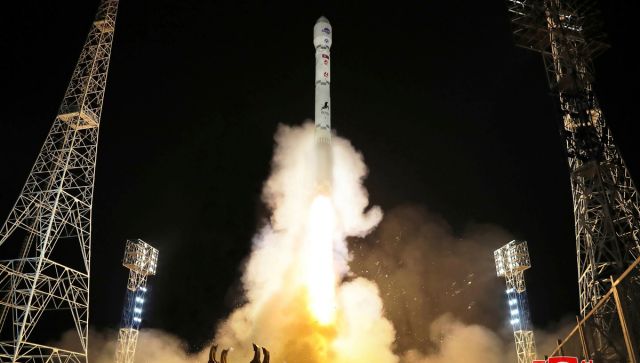The national security advisors of the United States, South Korea and Japan on Saturday urged for a more robust international effort to curb North Korea’s advancements in nuclear weapons and missiles, as well as its military collaborations with other nations, citing concerns about potential arms transfers to Russia. The meeting in Seoul took place amid heightened tensions on the Korean Peninsula, marked by North Korean leader Kim Jong Un’s accelerated nuclear and missile program expansion and the endorsement of an escalatory nuclear doctrine allowing preemptive nuclear weapon use. The United States and its Asian allies have responded by increasing the visibility of their trilateral security cooperation in the region and strengthening their combined military exercises, which Kim condemns as invasion rehearsals. In a joint news conference after the meeting, Cho said the three security advisers reaffirmed North Korea’s obligations under multiple U.N. Security Council resolutions that call for its denuclearization and ban any weapons trade with other countries. “We agreed to strengthen coordination among the three countries to secure the international community’s strict implementation" of the U.N. Security Council resolutions, Cho said. Cho said the three also highly praised South Korea, the U.S., Japan and Australia for announcing their sanctions on North Korea over its spy satellite launch last month. North Korea argues it has the right to launch spy satellites to monitor U.S. and South Korean military activities and enhance the threat of its nuclear-capable missiles. Washington, Seoul and Tokyo have also expressed concerns about a potential arms alignment between North Korea and Russia. They worry Kim is providing badly needed munitions to help Russian President Vladimir Putin wage war in Ukraine in exchange for Russian technology assistance to upgrade his nuclear-armed military. The United States, South Korea and Japan have agreed on new initiatives to respond to North Korea’s threats in cyberspace, including satellite launches and cryptocurrency abuses, White House National Security Adviser Jake Sullivan said on Saturday. Sullivan said the meeting followed up on commitments set forth at the Camp David trilateral summit hosted by U.S. President Joe Biden in August, where leaders of the three allies pledged to deepen security and economic cooperation. “We’ve also launched new trilateral initiatives to counter the threats posed by the DPRK, from its cybercrime and cryptocurrency money laundering to its reckless space and ballistic missile tests,” Sullivan told reporters, referring to North Korea by its official name, the Democratic People’s Republic of Korea (DPRK). The allies’ coordinated efforts would also target potential threats of economic coercion, Sullivan said, and they have finalised work on a supply chain early warning system, agreed to at Camp David, in critical minerals and rechargeable batteries. The Biden administration held the meeting at Camp David with South Korean President Yoon Suk Yeol and Japanese Prime Minister Fumio Kishida to project unity in the face of China’s growing power and nuclear threats from North Korea. North Korean state media said on Saturday that Pyongyang was determined to launch more spy satellites soon, calling space development part of its right to defend itself. After talks with Sullivan and Japan’s Takeo Akiba, South Korean national security adviser Cho Tae-yong said the three had also exchanged ideas on Ukraine and Middle East issues. Sullivan added that they “continue to stand up for peace and stability across the Taiwan Strait and freedom of navigation in the East and South China Seas”. With inputs from agencies.
The national security advisers of the United States, South Korea and Japan met in Seoul on Saturday as Pyongyang warned that it would deploy more spy satellites.
Advertisement
End of Article


)

)
)
)
)
)
)
)
)



